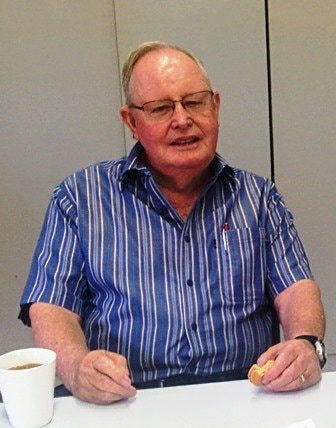In 1932, many jobless males walked the countryside looking for work, any type of work, if only to obtain a meal. Farms were routinely visited by these desperate men. Indian hawkers and their horse-drawn vehicles were regular visitors selling their wares.
In the 1930’s polio was termed infantile paralysis as there was then an epidemic to which my brother Basil (two years older than me) succumbed, but fortunately recovered from.
At my school in the late 1930’s we were regularly visited by men known as “swaggies” or swagmen because they normally carried a bag (swag). They were prepared to cut wood, tend the garden, milk the cows, or do any job that may be available. We had one regular who was affectionately called “Billy Butterfly”.
In September 1939 we saw the commencement of World War II. Our school was adjacent to the main Melbourne railway line. In the early 1940’s America joined the war and their troops came to Australia. We saw many “Yanks” and their tanks, jeeps and other warfare on the never-ending trains that went by.
One of my school mates left school and the next year, at age 14 years, came back to visit in an Army uniform. He was later deployed to Darwin where bombs were being dropped.
During the war years, and for a long time afterwards, we had to get used to the “ration tickets” which were required for practically every commodity, food, clothes, petrol. This saw the introduction to gas burners attached to the rear end of cars. It also saw the introduction of the popular, illegal practice of using kerosene to propel motor vehicles.
May and August of 1945 treated us to the termination of warfare in the Pacific and Europe. There were great celebrations by way of processions in the streets of every town in the country. My brother Pat returned from Tobruk.
1950 saw me entering the workforce. There was also the beginning of the Korean War and later on, National Service. I was too young to go to Korea and, believe it or not, too old for National Service. I had completed my registration form for National Service and went to the Post Office to mail it. At the entrance was a notice telling all eligible males to register and on re-reading it I became aware that I was one month too old. With some regret I destroyed my registration form and returned to my somewhat mundane job.
Work continued and I transferred to St. Arnaud, then Wodonga, and Melbourne in the early 1960s. At that time the Vietnam War was current, and my niece’s fiancé was drafted for service.
I then got married, completed my accounting qualifications, and had a successful business career.
I retired in 2000 and all was well in the world.
Then, in early 2020, the Corona Virus struck, and we now find ourselves in lockdown.
So, there you have it, “As Time Goes By”, reflections on historical events across a lifetime spanning 88 years (to date!).
Ray O’Shannessy
7 July 2020


 RSS Feed
RSS Feed
